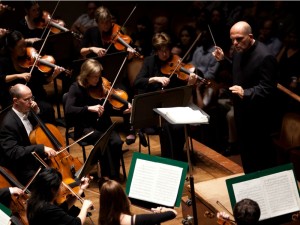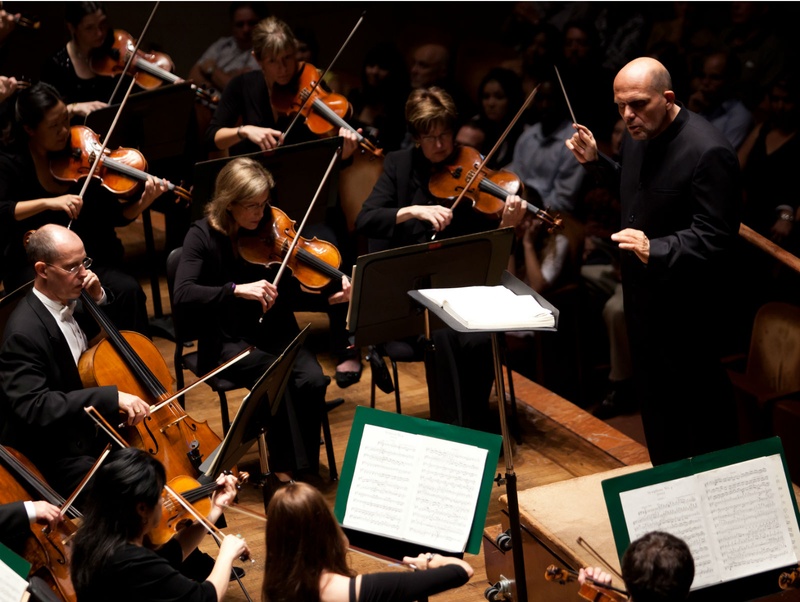
Last weekend was like heaven on earth for fans of large-scale choral orchestral works, with both major professional orchestras presenting monuments from the nineteenth-century oratorio repertoire. For those of us who get a rush from the sound of hundreds of voices behind a full orchestra, it doesn’t get much better.
The Dallas Symphony and music director Jaap van Zweden led in Thursday night at Meyerson Symphony Center with the first of four performances of Verdi’s monumental Requiem of 1874. It’s always tempting—and not at all misinformed—to listen for hints and shadows of the opera house in this unabashedly dramatic setting of the Roman Catholic mass for the dead. And the connoisseur of Verdi may, with respect for the melodic and dramatic genius displayed in that composer’s earlier masterpieces such as Aïda, Rigoletto, Traviata, and Trovatore, immediately observe that Verdi’s mastery of orchestration and harmonic invention has, in the Requiem, advanced by light years beyond those earlier works.
Conductor van Zweden emphasized the ongoing conflict of light and darkness in the Requiem, using the wonderful range of tone produced by the Dallas Symphony Chorus—from frighteningly demonic to ecstatically radiant—to get the point across. While many performances of this piece land on a questioning note in the final, quiet prayer, van Zweden pushed toward a more serene, accepting conclusion in that lonely, final plea. Soprano Hui He, mezzo-soprano Marianne Cornetti, tenor Giorgio Berrugi and bass Ain Anger supplied impressively grand renditions of the solo roles.
The Meyerson is a beautiful facility for large-scale choral works, and the 175-voice Dallas Symphony Chorus (trained by Joshua Habermann) is an exemplary ensemble for performance in that genre. One couldn’t help wishing for a larger presence of this sort of repertoire in the orchestra’s season, and possibly for even more large-scale choral orchestral works in that venue from visiting orchestras and from regional and national universities and conservatories. Why not use what is acoustically one of the finest rooms for choral-orchestral music in America to its full potential?
The Fort Worth Symphony and music director Miguel Harth-Bedoya, meanwhile, took on a somewhat abridged version of Mendelssohn’s Elijah for three performances beginning on Friday at Bass Performance Hall. Texas Christian University, Baylor University, and the Southwestern Baptist Theological Seminary provided almost 200 voices for the chorus.
There are probably several good reasons for abridging Elijah, not the least of which is the notoriously short attention span of the human brain in the 21st-century. (A live performance of this work with pauses and intermission takes up nearly three hours). While an uncut performance would be ideal, Harth-Bedoya quite reasonably chose to emphasize the dramatic passages in which something actually happens, including the contest between Elijah and the priests of Baal, the arrival of the long-awaited storm, and the raising of the son of the Widow from the dead. Unfortunately, he severely cut what might be called in contemporary drama the “dream sequence” in Part II, describing the nature of God in transcendent music and striking poetic imagery. In spite of the cuts to Mendelssohn’s score, Harth-Bedoya added the Psalom for Strings by Estonian composer Arvo Pärt as a sort of prologue. The tone of desolation set in this five-minute orchestral work admirably enhanced the concert, allowing the listener a doorway from the noisy, secular world in which we live into the visionary world of the oratorio which followed.
The performance as a whole, whether or not one accepts the cuts and the addition of a 20th-century prologue, was often breathtaking and always expertly paced, with superb readings in particular from the quartet of soloists that included TCU-trained soprano Ava Pine, SMU faculty member and mezzo-soprano Virginia Dupuy, baritone Jonathan Beyer in the demanding title role, and tenor Jonathan Boyd. Although as a multipurpose venue Bass Performance Hall is not quite as perfect for large-scale choral-orchestral works as the Meyerson Symphony Center, it is nonetheless well-suited overall for this sort of performance, and should be more often utilized in this way by the Fort Worth Symphony, as well as by guest orchestras and choruses.





